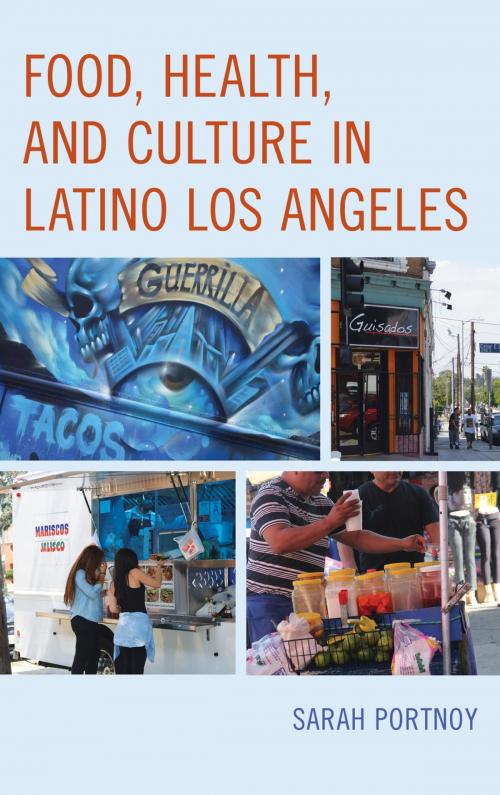Food, Health, and Culture in Latino Los Angeles
Nonfiction, Food & Drink, Food Writing, Social & Cultural Studies, Social Science, Anthropology| Author: | Sarah Portnoy | ISBN: | 9781442251304 |
| Publisher: | Rowman & Littlefield Publishers | Publication: | November 14, 2016 |
| Imprint: | Rowman & Littlefield Publishers | Language: | English |
| Author: | Sarah Portnoy |
| ISBN: | 9781442251304 |
| Publisher: | Rowman & Littlefield Publishers |
| Publication: | November 14, 2016 |
| Imprint: | Rowman & Littlefield Publishers |
| Language: | English |
Contemporary Los Angeles can increasingly be considered a part of Latin America. Only 200 miles from the border with Mexico, it has the largest, most diverse population of Latinos in the United States—and reportedly the second largest population of Mexicans outside of Mexico City. It also has one of the most diverse representations of Latino gastronomy in the United States, featuring the cuisine of nearly every region of Mexico, countries such as Peru, Argentina, Guatemala and El Salvador, as well as an incredible variety of Asian-Latin fusion cuisine.
Despite the expansion of Latino cuisine's popularity in Los Angeles and the celebrity of many Latino chefs, there is a stark divide between what is available at restaurants and food trucks and what is available to many low-income, urban Latinos who live in food deserts. In these areas, access to healthy, affordable, culturally appropriate foods is a daily challenge. Food-related diseases, particularly diabetes and obesity, plague these communities. In the face of this crisis, grassroots organizations, policy-makers and local residents are working to improve access and affordability through a growing embrace of traditional cuisine, an emergent interest in the farm-to-table movement, and the work of local organizations. Angelinos are creating alternatives to the industrial food system that offer hope for Latino food culture and health in Los Angeles and beyond.
This book provides an overview of contemporary L.A.’s Latino food culture, introducing some of the most important chefs in the Latino food scene, and discussing the history and impact of Latino street food on culinary variety in Los Angeles. Along with food culture, the book also discusses alternative sources of healthy food for low-income communities: farmers markets, community and school gardens, urban farms, and new neighborhood markets that work to address the inequalities in access and affordability for Latino residents. By making the connection between Latino food culture and the Latino communities’ food related health issues, this study approaches the issue from a unique perspective.
Contemporary Los Angeles can increasingly be considered a part of Latin America. Only 200 miles from the border with Mexico, it has the largest, most diverse population of Latinos in the United States—and reportedly the second largest population of Mexicans outside of Mexico City. It also has one of the most diverse representations of Latino gastronomy in the United States, featuring the cuisine of nearly every region of Mexico, countries such as Peru, Argentina, Guatemala and El Salvador, as well as an incredible variety of Asian-Latin fusion cuisine.
Despite the expansion of Latino cuisine's popularity in Los Angeles and the celebrity of many Latino chefs, there is a stark divide between what is available at restaurants and food trucks and what is available to many low-income, urban Latinos who live in food deserts. In these areas, access to healthy, affordable, culturally appropriate foods is a daily challenge. Food-related diseases, particularly diabetes and obesity, plague these communities. In the face of this crisis, grassroots organizations, policy-makers and local residents are working to improve access and affordability through a growing embrace of traditional cuisine, an emergent interest in the farm-to-table movement, and the work of local organizations. Angelinos are creating alternatives to the industrial food system that offer hope for Latino food culture and health in Los Angeles and beyond.
This book provides an overview of contemporary L.A.’s Latino food culture, introducing some of the most important chefs in the Latino food scene, and discussing the history and impact of Latino street food on culinary variety in Los Angeles. Along with food culture, the book also discusses alternative sources of healthy food for low-income communities: farmers markets, community and school gardens, urban farms, and new neighborhood markets that work to address the inequalities in access and affordability for Latino residents. By making the connection between Latino food culture and the Latino communities’ food related health issues, this study approaches the issue from a unique perspective.















